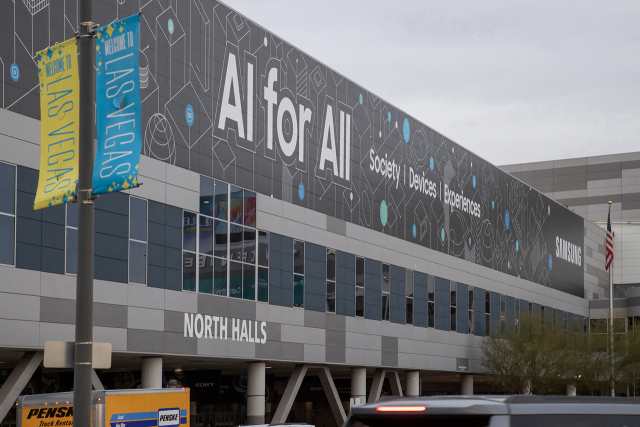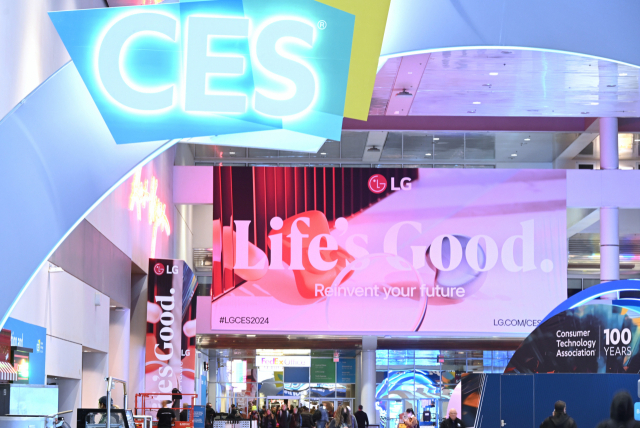 |
An outdoor billboard displays a Samsung Electronics advertisement at the CES 2024 venue in Las Vegas, Sunday. (Samsung Electronics) |
South Korean tech companies are gearing up to showcase their latest cutting-edge products and innovations at the upcoming CES 2024, the world’s largest tech trade show that opens Tuesday in Las Vegas.
After years of pandemic disruptions, this year’s CES is expected to attract over 130,000 visitors, making it second largest after a record 180,000 visitors in 2020, according to the event organizer, Consumer Technology Association.
Under the theme of “All On,” the upcoming CES will mainly explore the capabilities and future of artificial intelligence, demonstrating the technology’s impact across industries from smart homes and automotive to infrastructure and health care, as well as mobility.
Some 3,500 companies from more than 150 countries are flocking to the venue. Korea alone is sending about 700 of those companies, making it one of the top three exhibitors, after the US and China. The companies include Korea’s big four conglomerates, Samsung, SK, Hyundai Motor and LG.
Samsung
Samsung Electronics, the world’s largest smartphone and memory chip maker, is set to present its AI vision on a global scale for the first time.
The leading tech giant’s Vice Chairman and co-CEO Han Jong-hee will deliver a keynote address a day before exhibitions open, introducing the theme of "AI for All: Connectivity in the Age of AI."
Samsung Electronics occupies the largest exhibition space of 3,368 square meters at the Las Vegas Convention Center, which is to boast the company’s hyperconnected user experience based on its SmartThings smart home platform.
Following last month's debut of its own generative AI model, Samsung Gauss, the company will also unveil its latest products to utilize AI technology, ranging from Neo QLED TVs and new OLED TVs to the Galaxy Book 4 series, its first Galaxy Book series of laptops with AI features.
Samsung aims to show its latest kitchen innovations at the annual tech show by creating an upgraded food and kitchen ecosystem. Notable products and features in the display lineup will include the 2024 Bespoke refrigerator and Anyplace Induction Cooktop that feature Samsung’s upgraded AI and connectivity technologies.
The tech giant will also boast cutting-edge technologies regarding automotive solutions. Among them is a new partnership with Tesla, the world’s largest electric vehicle maker. Its SmartThings Energy will showcase an integrated service that helps monitor energy information of Tesla products from cars to home solar panels, with plans for a commercial debut in the second quarter in the US.
Harman, Samsung’s audio and in-car infotainment subsidiary, also will run a separate exhibition booth during the event.
SK
SK Group’s seven affiliates, including SK Inc., SK Innovation, SK hynix, SK Telecom and SK E&S, will jointly run a 1,850-square-meter pavilion, which is the group’s largest of its kind at the tech show.
Under the theme of “Inspire Happiness,” the group will showcase various net-zero technologies and products at one site, ranging from high-bandwidth memory and electric vehicle batteries to urban air mobility and small modular reactors.
The group will present its blueprint for a world free from the climate crisis -- the "net-zero world" -- via low-carbon technology. Decorated in a theme park concept, SK will let visitors ride a futuristic train and flying carpet operated by the group’s advanced technologies and seek advice from an AI fortuneteller.
SK hynix, the world's second-largest memory chip maker, will highlight its “Memory Centric” future vision, where memory chips play a bigger role in supporting new futuristic devices and AI features.
One of the key items is the fifth-generation high bandwidth memory chip, called HBM3E, an advanced chip for high-performance computing for AI technologies. The company plans to start the mass production of the chips in the first half of this year.
The group’s energy and environmental solutions provider unit SK Ecoplant will introduce low-carbon construction materials, including glass fiber-reinforced polymer reinforcing bars made from recycled polyethylene terephthalate resin and glass fiber and a low-carbon substitute for cement.
Meanwhile, SK said Chairman Chey Tae-won is scheduled to attend this year’s event to observe global AI trends. He is attending the tech show in person for a second year in a row.
LG
LG Electronics is poised to introduce its new AI-powered technologies. CEO Cho Joo-wan will lay out blueprints for the home appliance giant’s vision and innovation in AI-based future growth in his keynote speech.
Under the theme of “Reinvent Your Future,” the LG chief will unveil the firm’s key focuses for this year and highlight its bold vision to transform into a “smart life solutions provider” to upgrade its core identity as a top home appliance brand.
LG has been expanding its business portfolio to business-to-business segments, including automotive electronics and air solutions businesses.
It will showcase the future of smart homes powered by AI to enhance consumers’ living spaces and experiences. As an example, cameras and sensors affixed to LG’s home appliances can monitor users’ heart rates and breathing patterns and adjust indoor temperature and humidity.
With its “Zero Labor Home” vision, the company will unveil its new smart home AI agent -- a two-legged miniature robot that can move, learn and engage in complex conversations -- for the first time at CES.
Other key products include its newest QNED TV lineup with upgraded AI functions and a new concept car and cockpit platform featuring its new mobility vision, “Alpha-able.”
LG Innotek, the electronics component maker, also will set up an AI zone to display high-value semiconductor substrate products used for large-scale data analysis and processing.
 |
LG Electronics' advertisements are displayed at the CES 2024 tech show in Las Vegas, Sunday. (LG Electronics) |
Hyundai Motor
Hyundai Motor aims to make a significant impact with its most extensive showcase to date, focusing on three key areas: software-defined vehicles, hydrogen-powered sustainable mobility and urban air mobility innovations.
Executive Chair Chung Euisun and other top executives are expected to head to the CES pavilion to check industry trends and meet with business partners.
“I plan to look around many areas, such as robotics and health care, as well as AI,” Chung told reporters Wednesday after the group’s New Year's event.
Hyundai plans to unveil an ambitious strategy aimed at transitioning its entire fleet into software-defined vehicles by 2025, along with startups that it has acquired over the years, most notably 42dot, an autonomous driving software company founded by a former chief technology officer from Naver, Korea's largest IT company.
Software-defined vehicles are crucial for advancing autonomous driving technologies, where software controls everything from driving performance to safety features.
Hyundai has already integrated SDV technology in recent models such as the Hyundai Grandeur, Genesis GV60, G90 and notably the EV9, which boasts features like highway autonomous driving aids and the Kia Connect Store for post-purchase upgrades.
The company is also to detail its strategy for hydrogen-powered mobility solutions. It centers on the Hydrogen Business Toolbox, a collaborative initiative among its affiliates focused on establishing a hydrogen ecosystem, encompassing carbon-neutral hydrogen production, eco-friendly logistics and the sale of hydrogen electric vehicles. Hyundai has committed 11 trillion won ($8.4 billion) toward hydrogen cell development by 2030.
Highlighting the future of urban transportation, Hyundai's urban air mobility firm, Supernal, will showcase its strategy for a comprehensive ecosystem. This includes a full-scale model of their urban air mobility aircraft, slated for commercialization by 2028. Supernal will focus on the development of vertiports and the overall operations of urban air mobility vehicles, which are designed for to take off and land vertically to alleviate urban congestion.
Kia
Kia will reveal a range of purpose-built vehicles, or PBVs. These vehicles, primarily electric-powered and autonomous, are designed for specific applications, moving away from the traditional automotive approach.
Kia’s PBVs stand out for their modular design and adaptability. These vehicles are characterized by their versatile features, such as interchangeable cargo modules and customizable interiors, catering to a variety of functional requirements.
Kia's lineup includes five distinct models -- three medium-sized, one large and one small PBV concept car.
Kia will highlight its Easy Swap technology, which allows for rapid transformation of vehicle functions, and the Dynamic Hybrid system, enabling low-volume, tailored production.
The integration of autonomous driving technology with PBVs opens up future possibilities for these vehicles, including roles as robotaxis and uncrewed cargo transporters.
Kia plans to invest approximately 1 trillion won in a new PBV plant, aiming for mass production by the second half of 2025, with an initial annual output of 100,000, expandable based on market demand
HD Hyundai
Shipbuilding and heavy industries giant HD Hyundai will unveil its "Xite Transformation" vision, following last year's “Ocean Transformation” presentation.
The company is turning its focus from maritime to terrestrial innovation, targeting critical global issues like safety, supply chain construction and climate change.
This year's CES, where HD Hyundai marks its third consecutive appearance, will serve as a platform for the company to articulate a new approach to land infrastructure construction.
Keynoting the event, Vice Chairman Chung Ki-sun is expected to outline the company's strategy, emphasizing the integration of uncrewed and automated technologies in next-generation construction sites.
HD Hyundai's booths will be divided into three distinct but interconnected themes: Future Xite, Twin Xite and Zero Xite. Each zone will demonstrate HD Hyundai's prowess in innovating construction equipment and methodologies. Future Xite, in particular, promises a glimpse into the advanced future of construction sites, driven by automation and uncrewed technologies.
The group's expertise in this domain is underpinned by its three subsidiaries: HD Hyundai XiteSolution, HD Hyundai Construction Equipment and HD Hyundai Infracore Construction Equipment.
HD Hyundai XiteSolution, previously Hyundai Genuine, was renamed last year to align its identity with cutting-edge construction machinery solutions.



![[Weekender] Korea's traditional sauce culture gains global recognition](http://res.heraldm.com/phpwas/restmb_idxmake.php?idx=644&simg=/content/image/2024/11/21/20241121050153_0.jpg)



